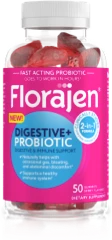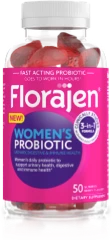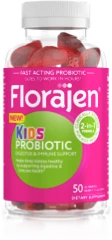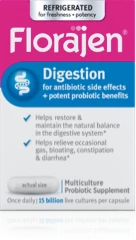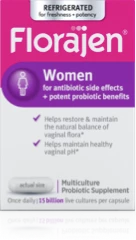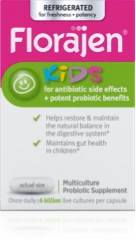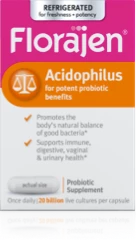Got Kids? You Might Want to Add Probiotics to Your Med Kit
As a parent, it’s natural to want to do everything you can to help your children stay healthy. Making sure they use bike helmets and seat belts, teaching good handwashing and mask-wearing habits, and eating nutritious foods are just a few of the ways families make wellness a priority. If diarrhea or respiratory illnesses are a concern in your household, incorporating a probiotic into your repertoire could make sense, too.
Pediatrics¹, the journal of the American Academy of Pediatrics, reports that the probiotic strain Lactobacillus rhamnosus (which can be found in Florajen Kids) can help shorten the duration of virus-related diarrhea in children by 1-2 days. The journal also says that probiotics seem to be most useful when given to otherwise healthy children early on in their diarrhea illness. Similarly, the medical journal Pediatric Gastroenterology, Hepatology & Nutrition², states that certain probiotic strains (including Lactobacillus rhamnosus) have been shown to help care for some diarrhea illnesses and to also help prevent diarrhea related to antibiotic use.
A pediatrician speaking about children’s health news with MDedge³ remarks that, “When it comes to probiotics for treating acute diarrhea in children, ‘the literature is actually fairly good here.’ More than 60 studies with an excess of 8,000 participants suggests probiotics are not associated with any adverse effects and generally shorten duration of diarrhea.”
In terms of antibiotic-associated diarrhea, Pediatrics¹ cites research showing that if probiotics are given to children at the beginning of antibiotic therapy, the risk of developing antibiotic-associated diarrhea can be reduced by about 17%, and that 1 in 7 cases of antibiotic-associated diarrhea can be prevented by the use of a probiotic.
The Italian Journal of Pediatrics⁴ reports that “due to the presence of compelling evidence,” numerous guidelines recommend probiotics to help kids with diarrhea. Lactobacillus rhamnosus, the pediatricians say, is the best studied probiotic strain for the treatment of children’s diarrhea and has received a strong recommendation by the European Society of Pediatric Gastroenterology, Hepatology and Nutrition.
Moving out of the bathroom, Pediatric Gastroenterology, Hepatology & Nutrition² says that probiotics, including Lactobacillus rhamnosus, have been shown to help reduce the risk of respiratory tract infections among children attending daycare centers, with kids taking probiotics missing fewer days at daycare. The benefit was especially pronounced among children with a history of recurrent respiratory infections during the winter months.
Florajen Kids is a probiotic that is specifically formulated for children to help ease the unpleasant side effects of antibiotics, restore the natural balance of good bacteria, support kids’ immune health, and maintain regularity in the digestive system. The strains or cultures in Florajen Kids consist of the same “good bacteria” that occur naturally in healthy people.
When you shop for a family probiotic, note that Florajen Kids is a refrigerated probiotic that can be found behind the counter with the pharmacist. Many off-the-shelf, unrefrigerated probiotics fall short in providing the number of live cultures experts say are necessary to help the natural “good” bacteria in your body do their jobs. Florajen is a non-prescription probiotic brand that maintains continuous refrigeration from manufacture to purchase. But, it’s still easy to find – just ask your pharmacist or shop now.
Concerned about allergens? Florajen’s family of probiotics DO NOT contain any of the eight primary allergens. This means Florajen Probiotics are free of milk (dairy), eggs, fish, shellfish, tree nuts, peanuts, wheat, and soy.
Remember, of course, that the Food and Drug Administration (FDA) does not regulate probiotics as medicine and all caregivers should talk to a pediatrician about both the risks and benefits of giving probiotics to a child.
*Harvard Medical School reports that probiotics are generally considered safe and to have no side effects. If there are side effects, they are usually very mild (like a little more gas than usual) and temporary. For most people in good health, WebMD says probiotics won’t cause any issues; however, people who have an immune deficiency, are critically ill, recently had surgery, or are being treated for cancer should consult their doctor before using probiotics. Also be sure to talk to a pediatrician before giving probiotics to your baby, especially if he or she is sick. Florajen Kids is recommended for children over 6 months of age.
1. https://pediatrics.aappublications.org/content/126/6/1217
2. https://www.ncbi.nlm.nih.gov/pmc/articles/PMC5636929/
4. https://ijponline.biomedcentral.com/articles/10.1186/s13052-020-00862-z
*These statements have not been evaluated by the Food and Drug Administration. These products are not intended to diagnose, treat, cure or prevent any disease.
CLINICAL REFERENCES:
- Segers ME, Lebeer S. Towards a better understanding of Lactobacillus rhamnosus GG - host interactions. Microbial Cell Factories. 2014;13(Suppl 1):S7. doi:10.1186/1475-2859-13-S1-S7. [LINK https://www.ncbi.nlm.nih.gov/pmc/articles/PMC4155824/ ]
- Sugahara H, et al. Probiotic Bifidobacterium longum alters gut luminal metabolism through modification of the gut microbial community. Scientific Reports 5, Article number: 13548 (2015) [LINK http://www.nature.com/articles/srep13548 ]
- Kirjavaninen et al. Aberrant composition of gut microbiota of allergic infants. FEMS Immunol Med Microbiol. 2001;32;1. https://www.ncbi.nlm.nih.gov/pmc/articles/PMC1773282/
Bjorksten et al. The intestinal microflora in allergic Estonian and Swedish infants. Clin Exp Allergy. 1999;29:342. - McFarland LV. Epidemiology, risk factors and treatments for antibiotic-associated diarrhea. Dig Dis. 1998;16(5):292-307
https://www.ncbi.nlm.nih.gov/pubmed/9892789 - Waigankar SS, Patel V. Role of probiotics in urogenital healthcare. Journal of Mid-Life Health. 2011;2(1):5-10. doi:10.4103/0976-7800.83253.
https://www.ncbi.nlm.nih.gov/pmc/articles/PMC3156505/
and
Vásquez A, Jakobsson T, Ahrné S, Forsum U, Molin G. Vaginal Lactobacillus Flora of Healthy Swedish Women. Journal of Clinical Microbiology. 2002;40(8):2746-2749. doi:10.1128/JCM.40.8.2746-2749.2002.
https://www.ncbi.nlm.nih.gov/pmc/articles/PMC120688/ - Wright JJ, Paauw DP. Complications of Antibiotic Therapy. Medical Clinics of North America; July 2013, 97(4): 667–679.
http://www.medical.theclinics.com/article/S0025-7125(13)00029-1/abstract - Vanderhoof J.A., et al . Lactobacillus GG in the prevention of antibiotic-associated diarrhea in children. J Pediatr. 1999;135(5):564-568.
https://www.ncbi.nlm.nih.gov/pubmed/10547243 - “ A.G. Mohamed, Hayam M. Abbas, Abeer F. Zayan and Nayra Sh. Mehanna, 2016. Bacterial Strains as Vitamins Supplements to Prepare Functional Dairy Beverages. American Journal of Food Technology, 11: 234-239. https://scialert.net/fulltextmobile/?doi=ajft.2016.234.239
- Probiotics, What’s the Bottom Line. National Center for Complementary and Integrative Health, National Institutes of Health website. Accessed April 2, 2017 https://www.nccih.nih.gov/health/probiotics-what-you-need-to-know
- Kim SE, et al. Change of Fecal Flora and Effectiveness of the Short-term VSL#3 Probiotic Treatment in Patients With Functional Constipation. Constipation Research group of Korean Society of Neurogastroenterology and Motility. J Neurogastroenterol Motil. 2015 Jan 1;21(1):111-20. doi: 10.5056/jnm14048. https://www.ncbi.nlm.nih.gov/pubmed/25537674
- Probiotics May Ease Constipation. Harvard Health Publications, Harvard Medical School website. Accessed April 4, 2017 http://www.health.harvard.edu/blog/probiotics-may-ease-constipation-201408217377
- Dimidi E, et al. The effect of probiotics on functional constipation in adults: a systematic review and meta-analysis of randomized controlled trials. The American Journal of Clinical Nutrition. August 6, 2014, doi:3945/ajcn.114.089151 https://ajcn.nutrition.org/article/S0002-9165(23)04789-5/fulltext
- Khalif IL, et al. Alterations in the colonic flora and intestinal permeability and evidence of immune activation in chronic constipation. Dig Liver Dis. 2005 Nov; 37(11):838-49. https://www.ncbi.nlm.nih.gov/pubmed/16169298
and
Barbara G, et al. Interactions between commensal bacteria and gut sensorimotor function in health and disease. Am J Gastroenterol.2005 Nov;100(11):2560-8. https://www.ncbi.nlm.nih.gov/pubmed/16279914 - Miller LE, Ouwehand AC. Probiotic supplementation decreases intestinal transit time: meta-analysis of randomized controlled trials. World J Gastroenterol. 2013 Aug 7; 19(29):4718-25. https://www.ncbi.nlm.nih.gov/pubmed/23922468
- Cha BK, et al. The effect of a multispecies probiotic mixture on the symptoms and fecal microbiota in diarrhea-dominant irritable bowel syndrome: a randomized, double-blind, placebo-controlled trial. J Clin Gastroenterol. 2012;46:220–227. doi: 10.1097/MCG.0b013e31823712b1.
and
Whorwell PJ, Altringer L, Morel J, et al. Efficacy of an encapsulated probiotic Bifidobacterium infantis 35624 in women with irritable bowel syndrome. Am J Gastroenterol. 2006;101:1581–1590. doi: 10.1111/j.1572-0241.2006.00734.x. - MedlinePlus, U.S. National Library of Medicine website. Accessed April 4, 2017 https://medlineplus.gov/diarrhea.html
- Using Probiotics for Diarrhea. WebMD website. Accessed April 4, 2017 http://www.webmd.com/digestive-disorders/probiotics-diarrhea#1
-
McFarland LV. Meta-analysis of probiotics for the prevention of traveler's diarrhea. Travel Med Infect Dis. 2007 Mar;5(2):97-105.
https://www.ncbi.nlm.nih.gov/pubmed/17298915
and
Traveler’s Diarrhea. Centers for Disease Control and Prevention website. Accessed March 31, 2017. https://wwwnc.cdc.gov/travel/yellowbook/2016/the-pre-travel-consultation/travelers-diarrhea - How to Prevent Diarrhea While You Take Antibiotics. Cleveland Clinic website. Accessed April 4, 2017 https://health.clevelandclinic.org/how-to-prevent-diarrhea-while-you-take-antibiotics
- Infectious diarrhea: Can probiotics help against diarrhea? PubMed Health, U.S. National Library of Medicine website. Accessed April 4, 2017. https://www.ncbi.nlm.nih.gov/pubmedhealth/PMH0088733/
- Based on market survey conducted by American Lifeline December 2016.
- Could Probiotics Help Alleviate your Functional Gastrointestinal Symptoms? International Foundation for Functional Gastrointestional Disorders website. Accessed April 4, 2017. https://www.iffgd.org/diet-treatments/could-probiotics-help-your-symptoms.html
- Kim HJ, et al. A randomized controlled trial of a probiotic, VSL#3, on gut transit and symptoms in diarrhoea-predominant irritable bowel syndrome. Aliment Pharmacol Ther (2003)17: 895–904. https://www.ncbi.nlm.nih.gov/pubmed/12656692
- Kim HJ, et al. A randomized controlled trial of a probiotic combination VSL# 3 and placebo in irritable bowel syndrome with bloating. Neurogastroenterol Motil (2005)17: 687–696. https://www.ncbi.nlm.nih.gov/pubmed/16185307
- Supplements for IBS: What Works? WebMD website. Accessed April 4, 2017 http://www.webmd.com/ibs/features/supplements-for-ibs-what-works#1
- Bloating 101: Why You Feel Bloated. WebMD website. Accessed April 4, 2017 http://www.webmd.com/digestive-disorders/diarrhea-10/bloated-bloating
- Health benefits of taking probiotics. Harvard Health Publications, Harvard Medical School website. Accessed March 31, 2017. http://www.health.harvard.edu/vitamins-and-supplements/health-benefits-of-taking-probiotics
- Survey of full-time U.S. pharmacists who stock Florajen, by DMD Healthcare Research, December 2015.
- Jiang, W., Ni, B., Liu, Z. et al. The Role of Probiotics in the Prevention and Treatment of Atopic Dermatitis in Children: An Updated Systematic Review and Meta-Analysis of Randomized Controlled Trials. Pediatr Drugs 22, 535–549 (2020). https://doi.org/10.1007/s40272-020-00410-6
- Tan‐Lim, CSC, Esteban‐Ipac, NAR, Mantaring, JBV, et al. Comparative effectiveness of probiotic strains for the treatment of pediatric atopic dermatitis: A systematic review and network meta‐analysis. Pediatr Allergy Immunol. 2021; 32: 124– 136. https://doi.org/10.1111/pai.13305
- M. Alexander Otto. “Yeast Infection Four Times as Likely with Penicillin Use.” Clinician Reviews, 13 Dec. 2016, https://www.mdedge.com/clinicianreviews/article/77427/infectious-diseases/yeast-infection-four-times-likely-penicillin-use?sso=true.
- Navarro-López V, Ramírez-Boscá A, Ramón-Vidal D, et al. Effect of Oral Administration of a Mixture of Probiotic Strains on SCORAD Index and Use of Topical Steroids in Young Patients With Moderate Atopic Dermatitis: A Randomized Clinical Trial. JAMA Dermatol. 2018;154(1):37–43. doi:10.1001/jamadermatol.2017.3647
- Yan F, Polk DB. Probiotics and immune health. Curr Opin Gastroenterol. 2011 Oct;27(6):496-501. doi: 10.1097/MOG.0b013e32834baa4d. PMID: 21897224; PMCID: PMC4006993. https://pubmed.ncbi.nlm.nih.gov/21897224/
- Hanifin JM, Reed ML; Eczema Prevalence and Impact Working Group. A population-based survey of eczema prevalence in the United States. Dermatitis. 2007 Jun;18(2):82-91. doi: 10.2310/6620.2007.06034. PMID: 17498413.
- Eczema Prevalence, Quality of Life and Economic Impact.” National Eczema Association, 16 Mar. 2021, https://nationaleczema.org/research/eczema-facts/.
- Elizabeth Campbell and Allen Sayler. “Medical Foods – Insights Into FDA's Interpretation and Enforcement.” Food Safety RSS, Food Safety, 6 Mar. 2018, https://www.food-safety.com/articles/5701-medical-foods-insighte28099s-into-fdae28099s-interpretation-and-enforcement.
- Simpson EL, Guttman-Yassky E, Margolis DJ, et al. Association of Inadequately Controlled Disease and Disease Severity With Patient-Reported Disease Burden in Adults With Atopic Dermatitis. JAMA Dermatol. 2018;154(8):903-912.
- Wei W, Anderson P, Gadkari A, et al. Extent and consequences of inadequate disease control among adults with a history of moderate to severe atopic dermatitis. J Dermatol. 2018;45(2):150-157.
- Study finds 1,000 species of bacteria on healthy human. Los Angeles Times website. https://www.latimes.com/archives/la-xpm-2009-may-29-sci-skin-bacteria29-story.html. Accessed April 13, 2021.
- Segers ME, Lebeer S. Towards a better understanding of Lactobacillus rhamnosus GG – host interactions. Microbial Cell Factories. 2014;13(Suppl 1):S7. doi:10.1186/1475-2859-13-S1-S7. https://www.ncbi.nlm.nih.gov/pmc/articles/PMC4155824/.
- Hill D, Sugrue I, Tobin C, Hill C, Stanton C, Ross RP. The Lactobacillus casei Group: History and Health Related Applications. Front Microbiol. 2018;9:2107. Published 2018 Sep 10. doi:10.3389/fmicb.2018.02107
- Chyn Boon Wong, Toshitaka Odamaki, Jin-zhong Xiao, Beneficial effects of Bifidobacterium longum subsp. longum BB536 on human health: Modulation of gut microbiome as the principal action, Journal of Functional Foods, Volume 54, 2019, Pages 506-519, ISSN 1756-4646, https://doi.org/10.1016/j.jff.2019.02.002.
- Sugahara H, et al. Probiotic Bifidobacterium longum alters gut luminal metabolism through modification of the gut microbial community. Scientific Reports 5, Article number: 13548 (2015) http://www.nature.com/articles/srep13548
SURVEY & TRIAL REFERENCES:
- #1 Pharmacist Recommended Probiotic based on 2025 IQVIA physician survey data
- Florajen Balance Study Data and Consensus Meeting, February 5, 2019, convened with Healthcare Professionals in the following specialties: Gastroenterology, Pediatric Gastroenterology, Obstetrics and Gynecology, Internal Medicine, Retail Pharmacy, Hospital Clinical Pharmacy



